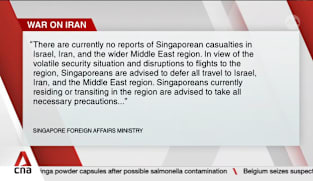Neil Parekh Nimil Rajnikant on Protection from Scams Bill
The escalating scam landscape poses a multifaceted threat to Singapore’s business ecosystem, with small- and medium-sized enterprises particularly vulnerable to sophisticated cyber threats that can inflict severe financial, operational and reputational damage. NMP Neil Parekh Nimil Rajnikant, who raised this concern in Parliament on Tuesday (Jan 7), warned that beyond monetary losses, businesses face increased cybersecurity investment costs, potential operational disruptions and erosion of customer trust. He said these challenges not only jeopardise companies' sustainability but also undermine the broader confidence in Singapore's digital economic infrastructure. The Protection from Scams Bill addresses this urgent and escalating challenge by empowering the police to issue temporary Restriction Orders (ROs) and providing a crucial window of protection for potential victims who may be transferring money to scammers. Mr Parekh pointed out that implementing these measures may pose operational challenges for financial institutions, requiring system adaptations and staff training. He also highlighted the opportunities for innovation, with increased demand for advanced fraud detection and prevention technologies. The tech sector stands to benefit greatly, he added. He also stressed the need to ensure that the measures do not unduly hinder legitimate international financial relationships and cross-border transactions. Mr Parekh also sought clarifications on the Bill. These include the minimum threshold for issuing ROs and the limits of immunity granted to banks and their staff, particularly in cases of unintentional errors.
The escalating scam landscape poses a multifaceted threat to Singapore’s business ecosystem, with small- and medium-sized enterprises particularly vulnerable to sophisticated cyber threats that can inflict severe financial, operational and reputational damage. NMP Neil Parekh Nimil Rajnikant, who raised this concern in Parliament on Tuesday (Jan 7), warned that beyond monetary losses, businesses face increased cybersecurity investment costs, potential operational disruptions and erosion of customer trust. He said these challenges not only jeopardise companies' sustainability but also undermine the broader confidence in Singapore's digital economic infrastructure. The Protection from Scams Bill addresses this urgent and escalating challenge by empowering the police to issue temporary Restriction Orders (ROs) and providing a crucial window of protection for potential victims who may be transferring money to scammers. Mr Parekh pointed out that implementing these measures may pose operational challenges for financial institutions, requiring system adaptations and staff training. He also highlighted the opportunities for innovation, with increased demand for advanced fraud detection and prevention technologies. The tech sector stands to benefit greatly, he added. He also stressed the need to ensure that the measures do not unduly hinder legitimate international financial relationships and cross-border transactions. Mr Parekh also sought clarifications on the Bill. These include the minimum threshold for issuing ROs and the limits of immunity granted to banks and their staff, particularly in cases of unintentional errors.



















